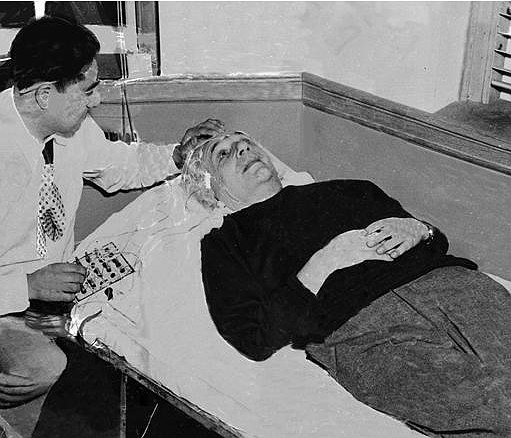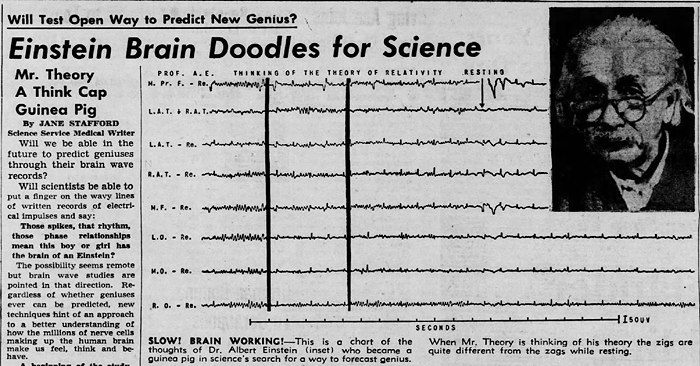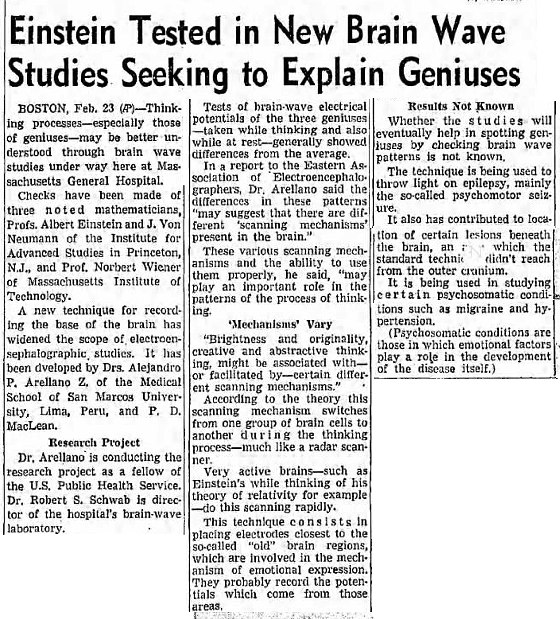Einstein’s Brain Waves
Sep 1950: Dr. Alejandro Arellano of Massachusetts General Hospital took readings of Einstein's brain waves while Einstein was thinking about his theory of relativity (special or general? It doesn't say), and while he was resting. It was noted that the zigs were quite different than the zags while Einstein was thinking of his theory. Based on this finding, it was hoped that in the future it might be possible to identify geniuses by their brain waves.





Pittsburgh Press - Feb 11, 1951

Los Angeles Times - Feb 24, 1951
Comments
Prof. Norbert Wiener was one subject. If he is Anthony Wiener's father, we may be able to go back and see what the the scanning mechanism of perversion looks like on paper.
Posted by Virtual on 07/26/17 at 03:05 PM
I remember a story that Einstein's brain is kept in a jar at Princeton U. Apparently someone thought that by looking at his physical brain in detail that his secret could be found. And apparently it seems no different than any other normal human brain, so that came to nothing.
Posted by KDP on 07/26/17 at 03:20 PM
I was told one a while ago:
Since I have never seen anything to support this, I assume I was being fed one.
Of course, the man’s brain has its own level of weirdness
Animals would learn a task (maze) faster if they ate the brain of a predecessor that had already learned the task. Using that as background a couple of scientists volunteered to eat Einstein’s brain.
Since I have never seen anything to support this, I assume I was being fed one.
Of course, the man’s brain has its own level of weirdness
Posted by crc on 07/26/17 at 05:16 PM
Congratulations, 1950 scientists. You just learned what brain waves look like when someone is thinking about science.
Posted by Yudith on 07/27/17 at 05:31 AM
Virtual: It's Norbert Wiener and Anthony Weiner. (And Norbert died before Anthony was born.)
crc: Your instincts were correct: it's bullshit.
Yudith: Be fair. In the 1950s, that was cutting-edge science.
crc: Your instincts were correct: it's bullshit.
Yudith: Be fair. In the 1950s, that was cutting-edge science.
Posted by Richard Bos on 07/27/17 at 11:17 AM
Richard, you weren't supposed to notice the speling difference.
Posted by Virtual on 07/29/17 at 12:53 PM
Sorry... I use to work for a local newspaper publisher, let's blame it on that.
Posted by Richard Bos on 07/30/17 at 05:29 AM
Commenting is not available in this channel entry.

Category: 1950s | Brain